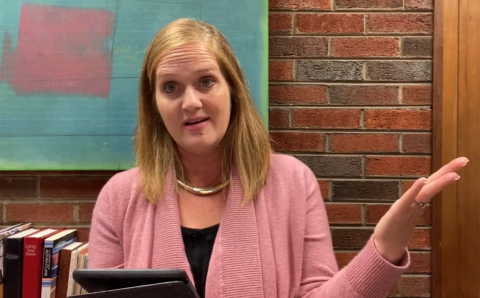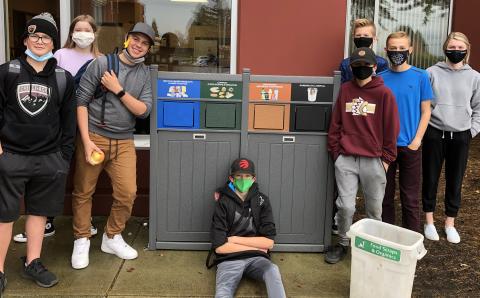A square peg trying to fit into a round hole.
That’s what Dirk vanEyk felt like while he was interning at Brookside Christian Reformed Church in Grand Rapids, Mich. He was completing his studies at Calvin Theological Seminary but had not grown up in a traditional church with pews and an organ. There wasn’t anything wrong with the church; he was just having a difficult time feeling as if he belonged.
“Maybe there’s an opportunity here,” Brookside pastor Paul DeVries told vanEyk one day. “Maybe instead of making you, a square peg, fit into a round hole, we make a square hole.”
That opportunity turned into Encounter, a church planted in nearby Kentwood, Mich. Within 10 years, Encounter has grown into an established congregation with hundreds of members and is in the process of planting another site today—and Encounter is just one of the many Christian Reformed church plants that have grown.
One of the CRCNA’s Our Journey 2025 ministry priorities is to share the gospel, live it missionally, and plant churches. When it comes to church planting, the “square peg/round hole” metaphor is a good one.
Whether it be age, ethnicity, culture, language, church model, how people connect to God in worship, or something else, it can be hard for people to find the right fit. Church plants are specifically designed to reach people that established churches haven’t been able to reach so people can be part of a community, learn about Jesus, and worship God in ways that resonate with them.
But church planting is hard work. It’s a denominational effort, and there’s one important support system the CRCNA has been having trouble finding: churches who are willing to plant and parent new churches.
“I think sometimes we hear this sort of sense that it’s church planting versus church renewal, and you have to pick one,” said Kevin Schutte, who works with Resonate Global Mission to lead church planting in the denomination. “Why spend money on a church plant when we could invest in our own?”
But it doesn’t have to be an either/or question, he explained. In fact, it’s usually more of a both/and situation.
While planting and parenting a church certainly comes with challenges and sacrifices, many established churches experience renewal in their own congregations through the process. They also see renewal in their neighborhoods as church plants reach people who are searching for a faith community where they feel as if they “fit” or belong.
Partnering to Bridge a Cultural and Racial Divide
Bethany CRC in Bellflower, Calif., is a church that dates back more than 75 years. Over the past few decades, people from a variety of cultures and backgrounds, especially Latino people, have found a home in the neighborhood.
That’s why Tomas Ivens decided to plant Ethnos Community Church and why Bethany offered to support it as a parent congregation. Ethnos is a bilingual church intent on reaching first- and second-generation Latinos in the community—and Bethany is walking alongside the church plant.
“I can tell that they are our partners, more than our mother or parent church,” said Ivens. “We are always trying to close that cultural and racial gap. … The community recognizes Bethany because they’ve been in the community 75 years. They have facilities, resources, and very talented and gifted people. But they don’t always know how to engage the community.”
The people who make up Ethnos, however, understand the cultural context. Ivens has a heart and a gift for outreach and knows how to engage the multicultural community, especially the growing Latino population. He serves on the board of a local nonprofit, has formed a relationship with the school district, and leads training for parents in the community.
Bethany provides meeting space, financial support, and prayer for Ethnos, and the two churches have worked together on outreach. During the COVID-19 pandemic, for instance, they made gift baskets with Dutch and Mexican treats and delivered them to neighbors in the community.
At least three people in their community accepted Christ this past year, and many more people are connecting with the churches, including seekers who are interested in learning more about Jesus.
Mirtha Villafane, who works with Resonate and Classis Greater Los Angeles, is working within the denomination to establish more churches for the growing Latino population in North America. There aren’t enough churches where people can worship in their culture and language, she said. Finding churches to parent new congregations is essential for those efforts.
“When you are an emerging church, you need a lot of people to help,” Villafane said. “What’s the commitment? Supervising and praying for the pastor, the church, and the emerging congregation. If you want to support them with money, that’s fine. If you can’t, that’s fine too.”
Partnership and support can take many forms, but a healthy relationship is key for ministry.
“The church has an opportunity to share the gospel of Jesus and to be part of the important role in the transformation of our communities,” Ivens said. “If we can do it together, it’s going to be more powerful.”
A New Demographic Encounters Jesus
Sometimes church plants reach across cultural and language barriers; sometimes they reach people who are looking for a good fit for their age, worship style, or preference for church model. That’s one of the reasons Brookside CRC decided to plant Encounter.
Meeting in a building just down the road from Brookside, Encounter has reached an entirely new demographic. While many young adults had been leaving traditional churches, most of the adults at Encounter are ages 18-29. Many of them, especially in the first few years, visited or started attending because parents or older adults in the area had told them about the new church plant.
“There were so many of these parents whose hearts broke for their kids who were getting disconnected from Jesus and weren’t attending church or weren’t practicing their faith, but were still identifying as Christian—kind of, sort of,” said vanEyk.
DeVries admits that it was difficult at times for his congregation to watch Encounter thrive in a way their church had not, but he also said that was the point.
“That’s part of the reason we started Encounter and blessed them: they’re going to do things that we won’t,” DeVries said. “It was more advantageous to God’s kingdom to start something entirely new.”
Alongside other churches in Classis Thornapple, Brookside gave financial support, but they also sent 60 members to plant Encounter with vanEyk. The church invited vanEyk and his team to use Brookside’s office space and, perhaps most importantly, DeVries provided mentorship.
“He helped me find resources and networks that I had no idea existed,” vanEyk said. “That was invaluable. I don’t think you could put a number on it.”
While it was initially stretching for Brookside, DeVries said that planting Encounter brought renewal to the congregation.
“As churches age and grow, just as human beings age and grow, you have to be thinking of your health,” said DeVries. “(Church planting) gives new energy and vision. … You need that thriving energy to stay healthy. You get so much long-term benefit. We have a lot of churches that are small and struggling and need renewal. We see church planting as one of the ways to help with that.”
Now Encounter is in the process of planting a church through a multisite model. A lot of people were driving 20 or more minutes to worship and other events. So, rather than starting an entirely new church, Encounter is establishing a new site to reach another neighborhood.
“Once you start driving in 20 minutes, it just gets harder,” said vanEyk. “It’s harder to join a Sunday morning serving team. It’s harder to join a small group. It’s harder to—this is a big one—invite your neighbors to church who don’t know Jesus.”
Churches in Classis Thornapple, including Brookside, have given a lot of financial support to Encounter as it works with a church planter to establish the new site.
“Church planting is something that gives Classis Thornapple energy,” DeVries said. “I think still too often churches think too individualistically. We’re in this together.”
Let’s partner together to plant more churches and reach more people. If you’re interested in planting or parenting a new church, Resonate and the CRCNA have resources to walk alongside you and support you in the process. Get started by visiting ResonateGlobalMission.org/starting.
About the Author
Cassie Westrate, Resonate Global Mission








